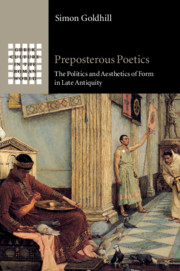Book contents
- Preposterous Poetics
- Greek Culture in the Roman World
- Preposterous Poetics
- Copyright page
- Contents
- Preface
- Acknowledgements
- Chapter 1 Forms of Attention
- Chapter 2 When Size Matters
- Chapter 3 In the Beginning
- Chapter 4 Preposterous Poetics and the Erotics of Death
- Chapter 5 Strange Dogs
- Chapter 6 Life Forms
- Coda
- References
- General Index
- Locorum Index
Chapter 6 - Life Forms
Biography and Rabbinical Writing
Published online by Cambridge University Press: 27 August 2020
- Preposterous Poetics
- Greek Culture in the Roman World
- Preposterous Poetics
- Copyright page
- Contents
- Preface
- Acknowledgements
- Chapter 1 Forms of Attention
- Chapter 2 When Size Matters
- Chapter 3 In the Beginning
- Chapter 4 Preposterous Poetics and the Erotics of Death
- Chapter 5 Strange Dogs
- Chapter 6 Life Forms
- Coda
- References
- General Index
- Locorum Index
Summary
In the previous chapter, we looked at a greatly under-appreciated piece of Greek prose that was articulated between the Septuagint and its critical readers, between Greco-Egyptian culture and Jewish anxiety about assimilation, between authoritative Jewish scriptural texts and later Christian readers and writers. It is a text that, whatever its origins, makes evident an arena where Jews and Christians were struggling to form and assert a coherent social self-understanding in and against dominant Greco-Roman culture. The recognition that the Roman Empire included citizens who were Roman and spoke Greek as well as Latin, and citizens who called themselves Greek and who felt conflicted about speaking Latin,1 and citizens of many different ethnic groupings, who spoke not only their own languages but also one or more of the privileged languages of the centre – Greek or Latin – and whose social standing and cultural positioning were articulated through these multi-lingual and culturally diverse interactions, has become a standard understanding of the transformations, translations and cultural interactions of late antiquity, although what the implications are for the study of the literature of the period still needs a good deal of work.
- Type
- Chapter
- Information
- Preposterous PoeticsThe Politics and Aesthetics of Form in Late Antiquity, pp. 194 - 235Publisher: Cambridge University PressPrint publication year: 2020



